Business Law Report: Legal Sources, Business Organizations, Disputes
VerifiedAdded on 2022/12/28
|22
|7468
|24
Report
AI Summary
This report provides a comprehensive overview of business law, examining various sources of law in the UK, including common law, statutory law, and European Union law, alongside the laws businesses must comply with, such as the Equality Act and Data Protection Act. It delves into the role of government in law-making, explaining the stages of parliamentary law-making and how statutory and common law are applied within the English and Welsh court system, including the civil and criminal justice systems. The report further explores different types of business organizations, their legal formation, management, and funding, assessing their advantages and disadvantages. Finally, it recommends legal solutions for resolving disputes, comparing different sources of legal advice and support, and evaluating their effectiveness in dispute resolution. The report's structure covers the sources of law, government's role, company, employment and contract law, different types of business organisations and alternate dispute resolutions.
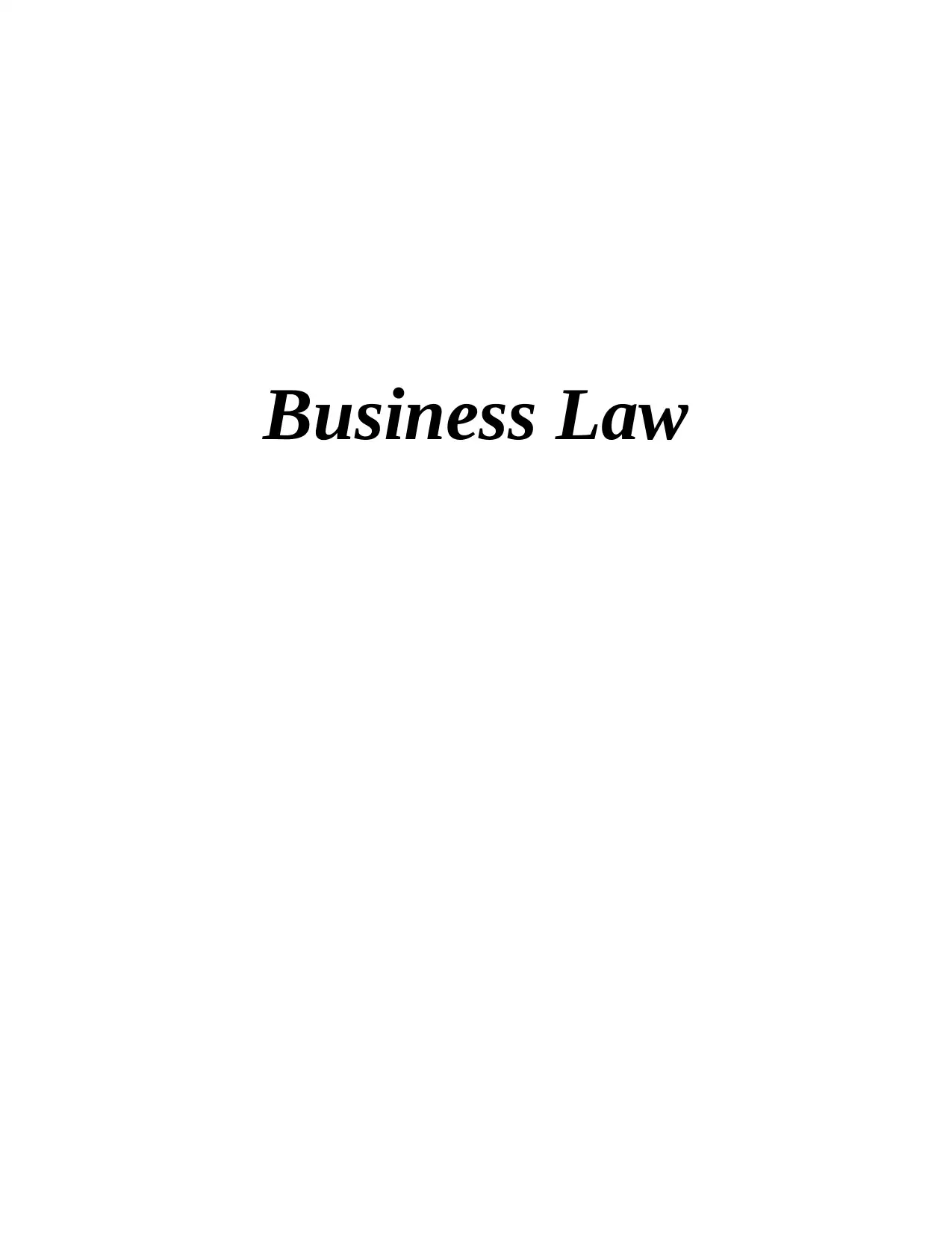
Business Law
Paraphrase This Document
Need a fresh take? Get an instant paraphrase of this document with our AI Paraphraser
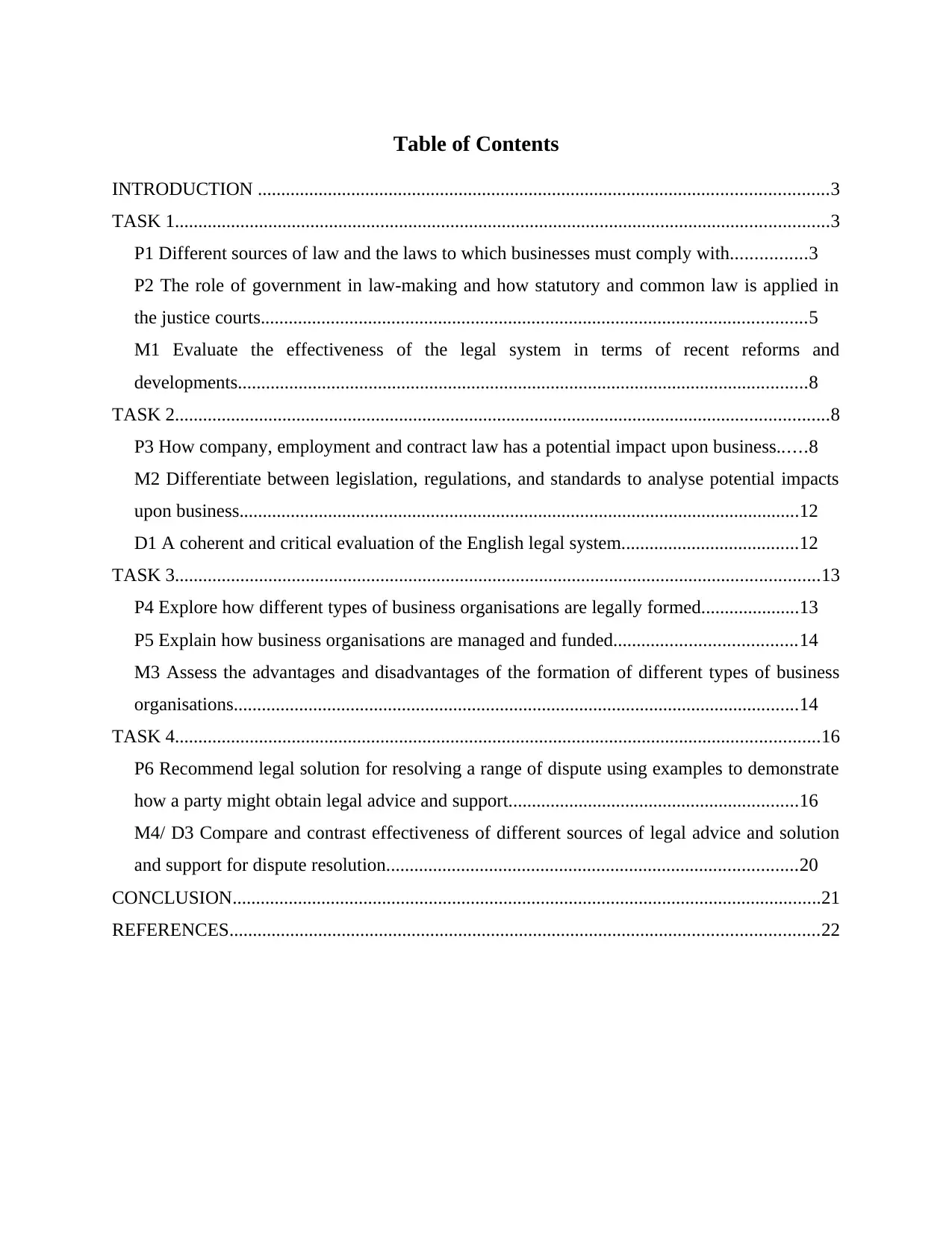
Table of Contents
INTRODUCTION ..........................................................................................................................3
TASK 1............................................................................................................................................3
P1 Different sources of law and the laws to which businesses must comply with................3
P2 The role of government in law-making and how statutory and common law is applied in
the justice courts.....................................................................................................................5
M1 Evaluate the effectiveness of the legal system in terms of recent reforms and
developments..........................................................................................................................8
TASK 2............................................................................................................................................8
P3 How company, employment and contract law has a potential impact upon business......8
M2 Differentiate between legislation, regulations, and standards to analyse potential impacts
upon business........................................................................................................................12
D1 A coherent and critical evaluation of the English legal system......................................12
TASK 3..........................................................................................................................................13
P4 Explore how different types of business organisations are legally formed.....................13
P5 Explain how business organisations are managed and funded.......................................14
M3 Assess the advantages and disadvantages of the formation of different types of business
organisations.........................................................................................................................14
TASK 4..........................................................................................................................................16
P6 Recommend legal solution for resolving a range of dispute using examples to demonstrate
how a party might obtain legal advice and support..............................................................16
M4/ D3 Compare and contrast effectiveness of different sources of legal advice and solution
and support for dispute resolution........................................................................................20
CONCLUSION..............................................................................................................................21
REFERENCES..............................................................................................................................22
INTRODUCTION ..........................................................................................................................3
TASK 1............................................................................................................................................3
P1 Different sources of law and the laws to which businesses must comply with................3
P2 The role of government in law-making and how statutory and common law is applied in
the justice courts.....................................................................................................................5
M1 Evaluate the effectiveness of the legal system in terms of recent reforms and
developments..........................................................................................................................8
TASK 2............................................................................................................................................8
P3 How company, employment and contract law has a potential impact upon business......8
M2 Differentiate between legislation, regulations, and standards to analyse potential impacts
upon business........................................................................................................................12
D1 A coherent and critical evaluation of the English legal system......................................12
TASK 3..........................................................................................................................................13
P4 Explore how different types of business organisations are legally formed.....................13
P5 Explain how business organisations are managed and funded.......................................14
M3 Assess the advantages and disadvantages of the formation of different types of business
organisations.........................................................................................................................14
TASK 4..........................................................................................................................................16
P6 Recommend legal solution for resolving a range of dispute using examples to demonstrate
how a party might obtain legal advice and support..............................................................16
M4/ D3 Compare and contrast effectiveness of different sources of legal advice and solution
and support for dispute resolution........................................................................................20
CONCLUSION..............................................................................................................................21
REFERENCES..............................................................................................................................22
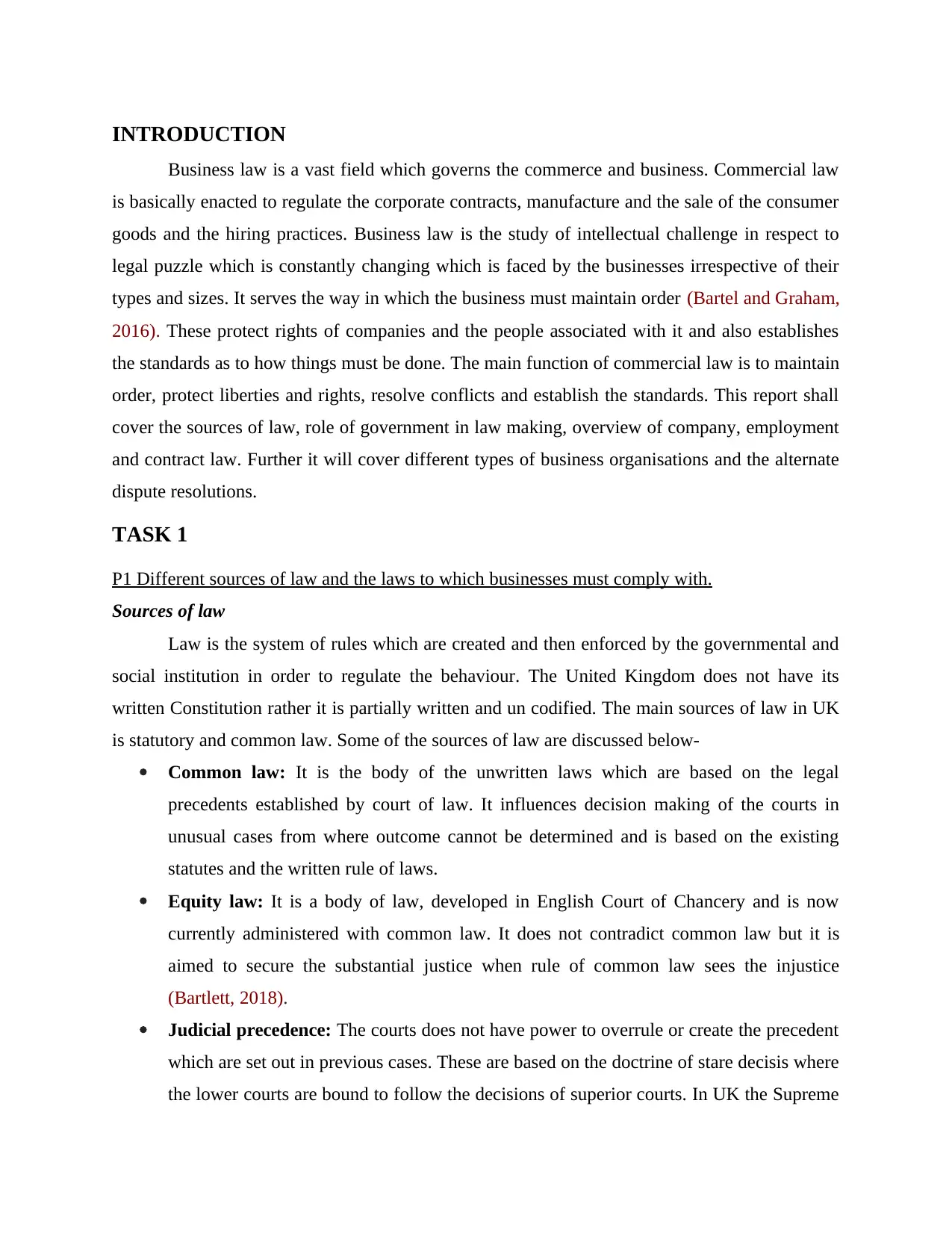
INTRODUCTION
Business law is a vast field which governs the commerce and business. Commercial law
is basically enacted to regulate the corporate contracts, manufacture and the sale of the consumer
goods and the hiring practices. Business law is the study of intellectual challenge in respect to
legal puzzle which is constantly changing which is faced by the businesses irrespective of their
types and sizes. It serves the way in which the business must maintain order (Bartel and Graham,
2016). These protect rights of companies and the people associated with it and also establishes
the standards as to how things must be done. The main function of commercial law is to maintain
order, protect liberties and rights, resolve conflicts and establish the standards. This report shall
cover the sources of law, role of government in law making, overview of company, employment
and contract law. Further it will cover different types of business organisations and the alternate
dispute resolutions.
TASK 1
P1 Different sources of law and the laws to which businesses must comply with.
Sources of law
Law is the system of rules which are created and then enforced by the governmental and
social institution in order to regulate the behaviour. The United Kingdom does not have its
written Constitution rather it is partially written and un codified. The main sources of law in UK
is statutory and common law. Some of the sources of law are discussed below-
Common law: It is the body of the unwritten laws which are based on the legal
precedents established by court of law. It influences decision making of the courts in
unusual cases from where outcome cannot be determined and is based on the existing
statutes and the written rule of laws.
Equity law: It is a body of law, developed in English Court of Chancery and is now
currently administered with common law. It does not contradict common law but it is
aimed to secure the substantial justice when rule of common law sees the injustice
(Bartlett, 2018).
Judicial precedence: The courts does not have power to overrule or create the precedent
which are set out in previous cases. These are based on the doctrine of stare decisis where
the lower courts are bound to follow the decisions of superior courts. In UK the Supreme
Business law is a vast field which governs the commerce and business. Commercial law
is basically enacted to regulate the corporate contracts, manufacture and the sale of the consumer
goods and the hiring practices. Business law is the study of intellectual challenge in respect to
legal puzzle which is constantly changing which is faced by the businesses irrespective of their
types and sizes. It serves the way in which the business must maintain order (Bartel and Graham,
2016). These protect rights of companies and the people associated with it and also establishes
the standards as to how things must be done. The main function of commercial law is to maintain
order, protect liberties and rights, resolve conflicts and establish the standards. This report shall
cover the sources of law, role of government in law making, overview of company, employment
and contract law. Further it will cover different types of business organisations and the alternate
dispute resolutions.
TASK 1
P1 Different sources of law and the laws to which businesses must comply with.
Sources of law
Law is the system of rules which are created and then enforced by the governmental and
social institution in order to regulate the behaviour. The United Kingdom does not have its
written Constitution rather it is partially written and un codified. The main sources of law in UK
is statutory and common law. Some of the sources of law are discussed below-
Common law: It is the body of the unwritten laws which are based on the legal
precedents established by court of law. It influences decision making of the courts in
unusual cases from where outcome cannot be determined and is based on the existing
statutes and the written rule of laws.
Equity law: It is a body of law, developed in English Court of Chancery and is now
currently administered with common law. It does not contradict common law but it is
aimed to secure the substantial justice when rule of common law sees the injustice
(Bartlett, 2018).
Judicial precedence: The courts does not have power to overrule or create the precedent
which are set out in previous cases. These are based on the doctrine of stare decisis where
the lower courts are bound to follow the decisions of superior courts. In UK the Supreme
⊘ This is a preview!⊘
Do you want full access?
Subscribe today to unlock all pages.

Trusted by 1+ million students worldwide
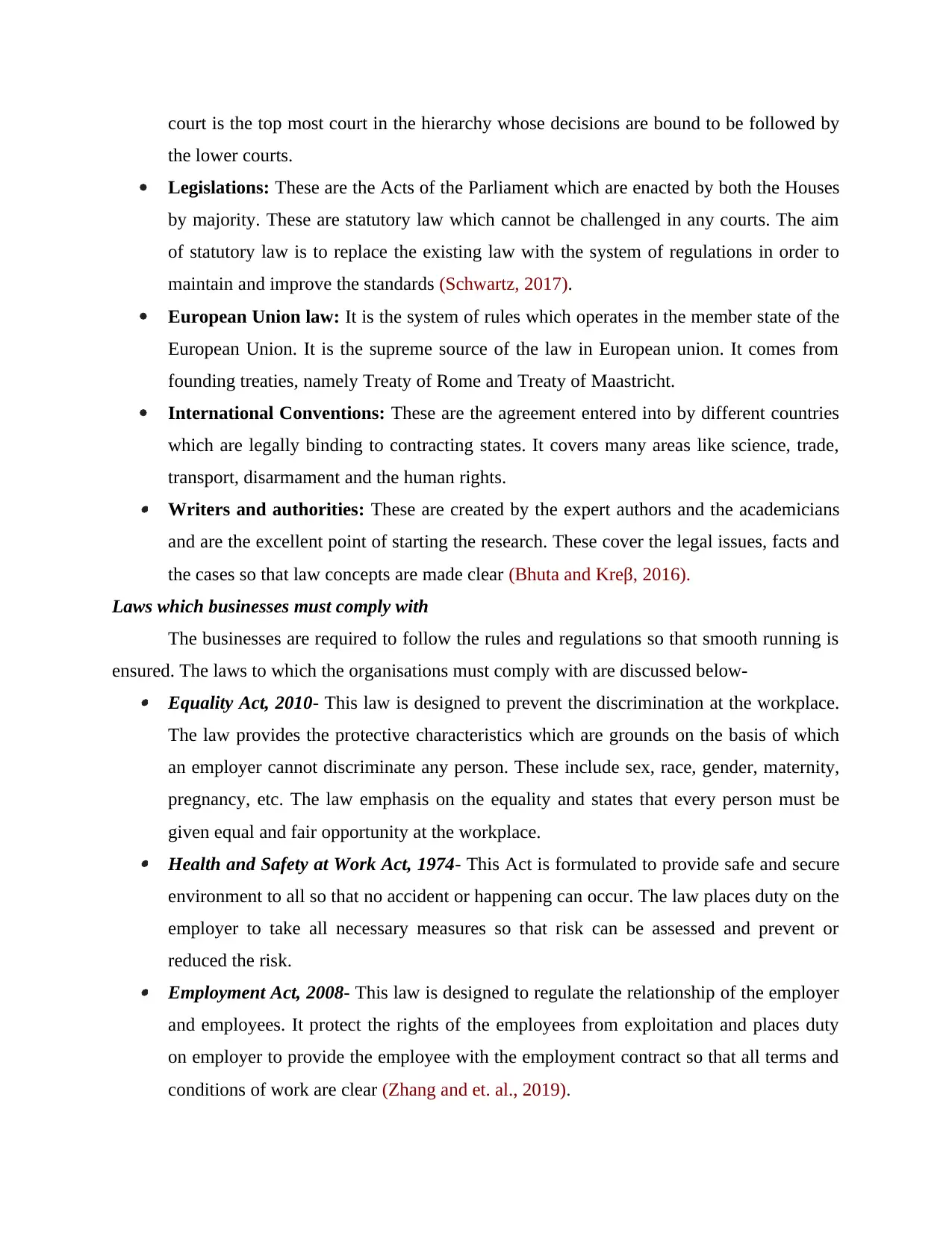
court is the top most court in the hierarchy whose decisions are bound to be followed by
the lower courts.
Legislations: These are the Acts of the Parliament which are enacted by both the Houses
by majority. These are statutory law which cannot be challenged in any courts. The aim
of statutory law is to replace the existing law with the system of regulations in order to
maintain and improve the standards (Schwartz, 2017).
European Union law: It is the system of rules which operates in the member state of the
European Union. It is the supreme source of the law in European union. It comes from
founding treaties, namely Treaty of Rome and Treaty of Maastricht.
International Conventions: These are the agreement entered into by different countries
which are legally binding to contracting states. It covers many areas like science, trade,
transport, disarmament and the human rights. Writers and authorities: These are created by the expert authors and the academicians
and are the excellent point of starting the research. These cover the legal issues, facts and
the cases so that law concepts are made clear (Bhuta and Kreβ, 2016).
Laws which businesses must comply with
The businesses are required to follow the rules and regulations so that smooth running is
ensured. The laws to which the organisations must comply with are discussed below- Equality Act, 2010- This law is designed to prevent the discrimination at the workplace.
The law provides the protective characteristics which are grounds on the basis of which
an employer cannot discriminate any person. These include sex, race, gender, maternity,
pregnancy, etc. The law emphasis on the equality and states that every person must be
given equal and fair opportunity at the workplace. Health and Safety at Work Act, 1974- This Act is formulated to provide safe and secure
environment to all so that no accident or happening can occur. The law places duty on the
employer to take all necessary measures so that risk can be assessed and prevent or
reduced the risk. Employment Act, 2008- This law is designed to regulate the relationship of the employer
and employees. It protect the rights of the employees from exploitation and places duty
on employer to provide the employee with the employment contract so that all terms and
conditions of work are clear (Zhang and et. al., 2019).
the lower courts.
Legislations: These are the Acts of the Parliament which are enacted by both the Houses
by majority. These are statutory law which cannot be challenged in any courts. The aim
of statutory law is to replace the existing law with the system of regulations in order to
maintain and improve the standards (Schwartz, 2017).
European Union law: It is the system of rules which operates in the member state of the
European Union. It is the supreme source of the law in European union. It comes from
founding treaties, namely Treaty of Rome and Treaty of Maastricht.
International Conventions: These are the agreement entered into by different countries
which are legally binding to contracting states. It covers many areas like science, trade,
transport, disarmament and the human rights. Writers and authorities: These are created by the expert authors and the academicians
and are the excellent point of starting the research. These cover the legal issues, facts and
the cases so that law concepts are made clear (Bhuta and Kreβ, 2016).
Laws which businesses must comply with
The businesses are required to follow the rules and regulations so that smooth running is
ensured. The laws to which the organisations must comply with are discussed below- Equality Act, 2010- This law is designed to prevent the discrimination at the workplace.
The law provides the protective characteristics which are grounds on the basis of which
an employer cannot discriminate any person. These include sex, race, gender, maternity,
pregnancy, etc. The law emphasis on the equality and states that every person must be
given equal and fair opportunity at the workplace. Health and Safety at Work Act, 1974- This Act is formulated to provide safe and secure
environment to all so that no accident or happening can occur. The law places duty on the
employer to take all necessary measures so that risk can be assessed and prevent or
reduced the risk. Employment Act, 2008- This law is designed to regulate the relationship of the employer
and employees. It protect the rights of the employees from exploitation and places duty
on employer to provide the employee with the employment contract so that all terms and
conditions of work are clear (Zhang and et. al., 2019).
Paraphrase This Document
Need a fresh take? Get an instant paraphrase of this document with our AI Paraphraser
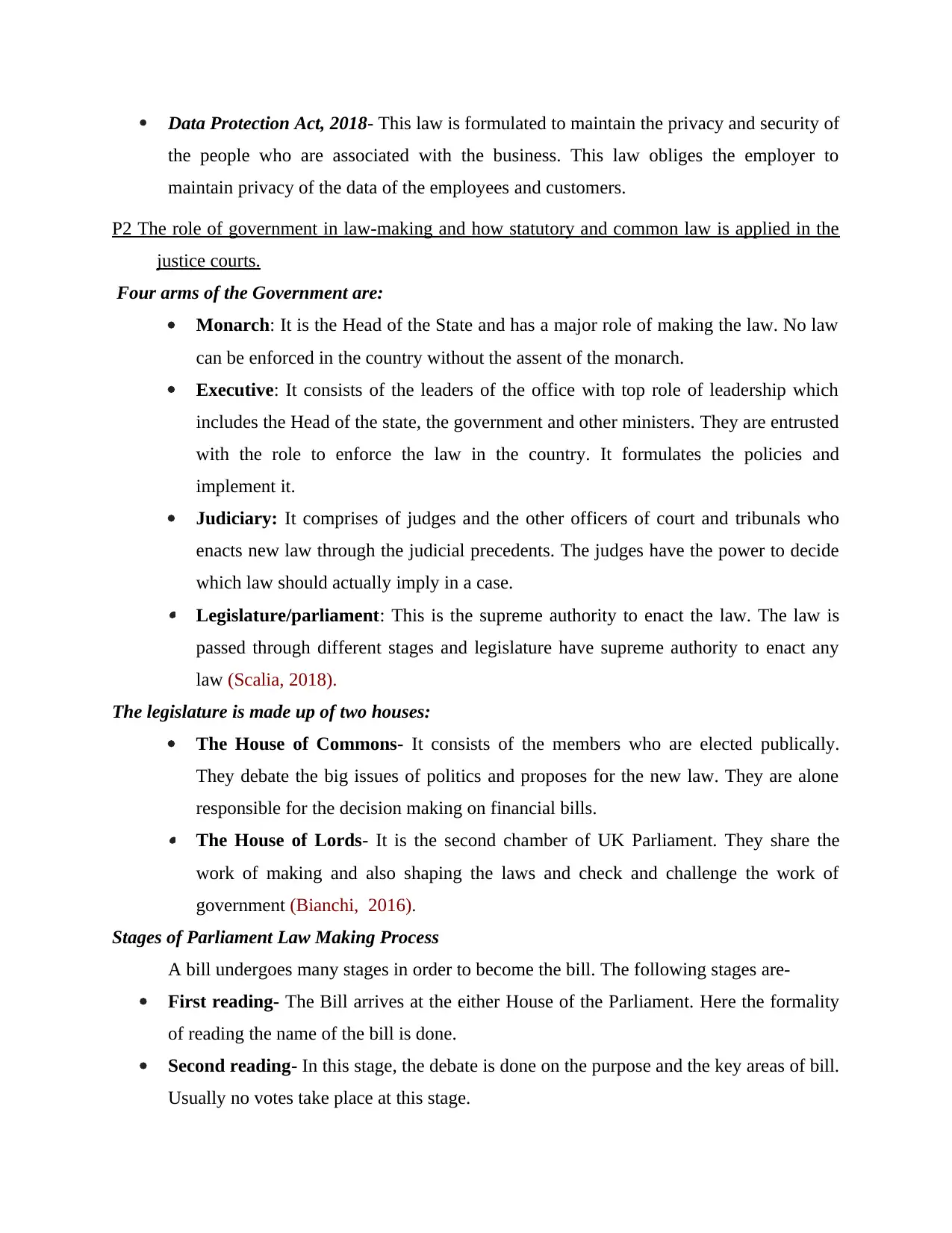
Data Protection Act, 2018- This law is formulated to maintain the privacy and security of
the people who are associated with the business. This law obliges the employer to
maintain privacy of the data of the employees and customers.
P2 The role of government in law-making and how statutory and common law is applied in the
justice courts.
Four arms of the Government are:
Monarch: It is the Head of the State and has a major role of making the law. No law
can be enforced in the country without the assent of the monarch.
Executive: It consists of the leaders of the office with top role of leadership which
includes the Head of the state, the government and other ministers. They are entrusted
with the role to enforce the law in the country. It formulates the policies and
implement it.
Judiciary: It comprises of judges and the other officers of court and tribunals who
enacts new law through the judicial precedents. The judges have the power to decide
which law should actually imply in a case.
Legislature/parliament: This is the supreme authority to enact the law. The law is
passed through different stages and legislature have supreme authority to enact any
law (Scalia, 2018).
The legislature is made up of two houses:
The House of Commons- It consists of the members who are elected publically.
They debate the big issues of politics and proposes for the new law. They are alone
responsible for the decision making on financial bills.
The House of Lords- It is the second chamber of UK Parliament. They share the
work of making and also shaping the laws and check and challenge the work of
government (Bianchi, 2016).
Stages of Parliament Law Making Process
A bill undergoes many stages in order to become the bill. The following stages are-
First reading- The Bill arrives at the either House of the Parliament. Here the formality
of reading the name of the bill is done.
Second reading- In this stage, the debate is done on the purpose and the key areas of bill.
Usually no votes take place at this stage.
the people who are associated with the business. This law obliges the employer to
maintain privacy of the data of the employees and customers.
P2 The role of government in law-making and how statutory and common law is applied in the
justice courts.
Four arms of the Government are:
Monarch: It is the Head of the State and has a major role of making the law. No law
can be enforced in the country without the assent of the monarch.
Executive: It consists of the leaders of the office with top role of leadership which
includes the Head of the state, the government and other ministers. They are entrusted
with the role to enforce the law in the country. It formulates the policies and
implement it.
Judiciary: It comprises of judges and the other officers of court and tribunals who
enacts new law through the judicial precedents. The judges have the power to decide
which law should actually imply in a case.
Legislature/parliament: This is the supreme authority to enact the law. The law is
passed through different stages and legislature have supreme authority to enact any
law (Scalia, 2018).
The legislature is made up of two houses:
The House of Commons- It consists of the members who are elected publically.
They debate the big issues of politics and proposes for the new law. They are alone
responsible for the decision making on financial bills.
The House of Lords- It is the second chamber of UK Parliament. They share the
work of making and also shaping the laws and check and challenge the work of
government (Bianchi, 2016).
Stages of Parliament Law Making Process
A bill undergoes many stages in order to become the bill. The following stages are-
First reading- The Bill arrives at the either House of the Parliament. Here the formality
of reading the name of the bill is done.
Second reading- In this stage, the debate is done on the purpose and the key areas of bill.
Usually no votes take place at this stage.
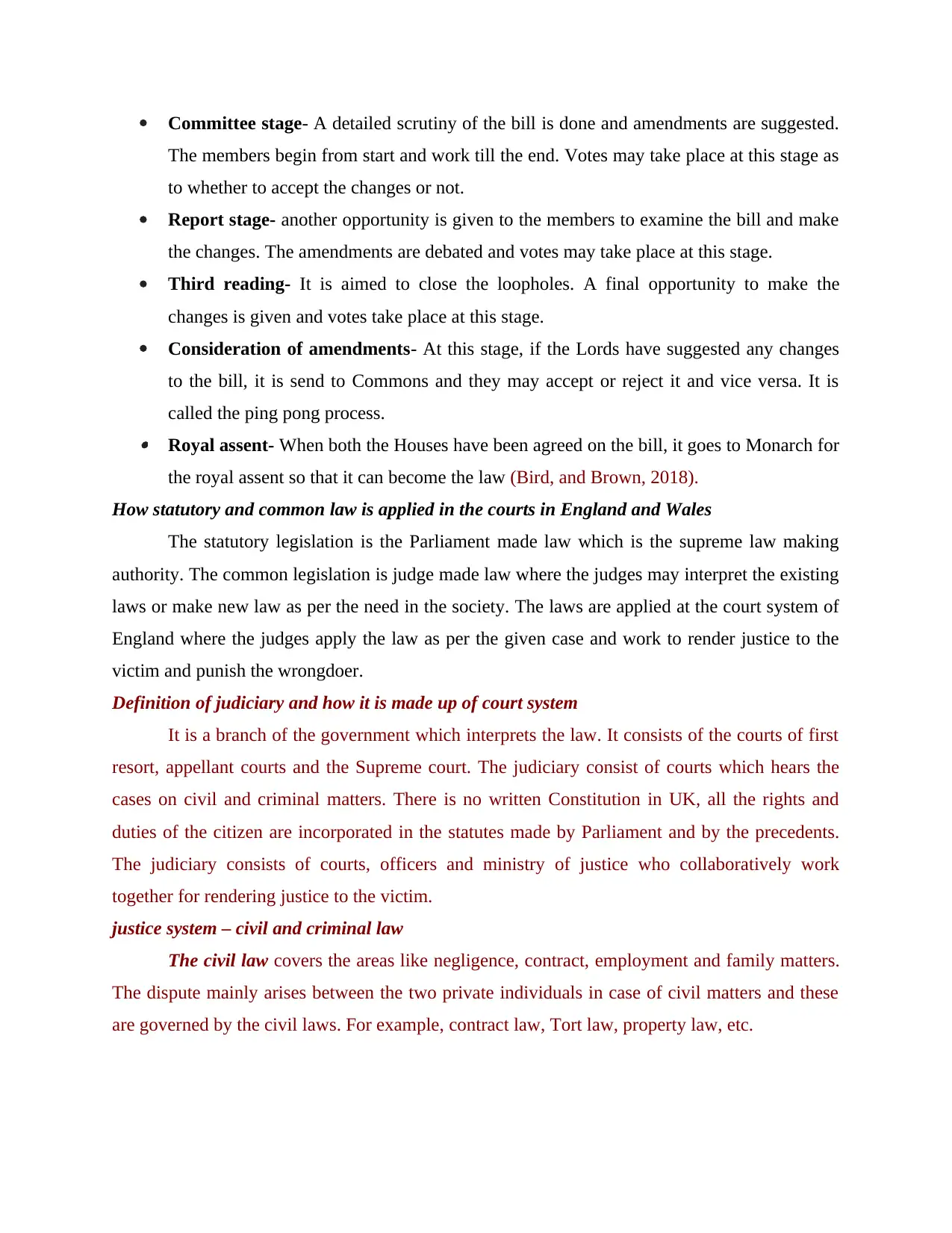
Committee stage- A detailed scrutiny of the bill is done and amendments are suggested.
The members begin from start and work till the end. Votes may take place at this stage as
to whether to accept the changes or not.
Report stage- another opportunity is given to the members to examine the bill and make
the changes. The amendments are debated and votes may take place at this stage.
Third reading- It is aimed to close the loopholes. A final opportunity to make the
changes is given and votes take place at this stage.
Consideration of amendments- At this stage, if the Lords have suggested any changes
to the bill, it is send to Commons and they may accept or reject it and vice versa. It is
called the ping pong process. Royal assent- When both the Houses have been agreed on the bill, it goes to Monarch for
the royal assent so that it can become the law (Bird, and Brown, 2018).
How statutory and common law is applied in the courts in England and Wales
The statutory legislation is the Parliament made law which is the supreme law making
authority. The common legislation is judge made law where the judges may interpret the existing
laws or make new law as per the need in the society. The laws are applied at the court system of
England where the judges apply the law as per the given case and work to render justice to the
victim and punish the wrongdoer.
Definition of judiciary and how it is made up of court system
It is a branch of the government which interprets the law. It consists of the courts of first
resort, appellant courts and the Supreme court. The judiciary consist of courts which hears the
cases on civil and criminal matters. There is no written Constitution in UK, all the rights and
duties of the citizen are incorporated in the statutes made by Parliament and by the precedents.
The judiciary consists of courts, officers and ministry of justice who collaboratively work
together for rendering justice to the victim.
justice system – civil and criminal law
The civil law covers the areas like negligence, contract, employment and family matters.
The dispute mainly arises between the two private individuals in case of civil matters and these
are governed by the civil laws. For example, contract law, Tort law, property law, etc.
The members begin from start and work till the end. Votes may take place at this stage as
to whether to accept the changes or not.
Report stage- another opportunity is given to the members to examine the bill and make
the changes. The amendments are debated and votes may take place at this stage.
Third reading- It is aimed to close the loopholes. A final opportunity to make the
changes is given and votes take place at this stage.
Consideration of amendments- At this stage, if the Lords have suggested any changes
to the bill, it is send to Commons and they may accept or reject it and vice versa. It is
called the ping pong process. Royal assent- When both the Houses have been agreed on the bill, it goes to Monarch for
the royal assent so that it can become the law (Bird, and Brown, 2018).
How statutory and common law is applied in the courts in England and Wales
The statutory legislation is the Parliament made law which is the supreme law making
authority. The common legislation is judge made law where the judges may interpret the existing
laws or make new law as per the need in the society. The laws are applied at the court system of
England where the judges apply the law as per the given case and work to render justice to the
victim and punish the wrongdoer.
Definition of judiciary and how it is made up of court system
It is a branch of the government which interprets the law. It consists of the courts of first
resort, appellant courts and the Supreme court. The judiciary consist of courts which hears the
cases on civil and criminal matters. There is no written Constitution in UK, all the rights and
duties of the citizen are incorporated in the statutes made by Parliament and by the precedents.
The judiciary consists of courts, officers and ministry of justice who collaboratively work
together for rendering justice to the victim.
justice system – civil and criminal law
The civil law covers the areas like negligence, contract, employment and family matters.
The dispute mainly arises between the two private individuals in case of civil matters and these
are governed by the civil laws. For example, contract law, Tort law, property law, etc.
⊘ This is a preview!⊘
Do you want full access?
Subscribe today to unlock all pages.

Trusted by 1+ million students worldwide
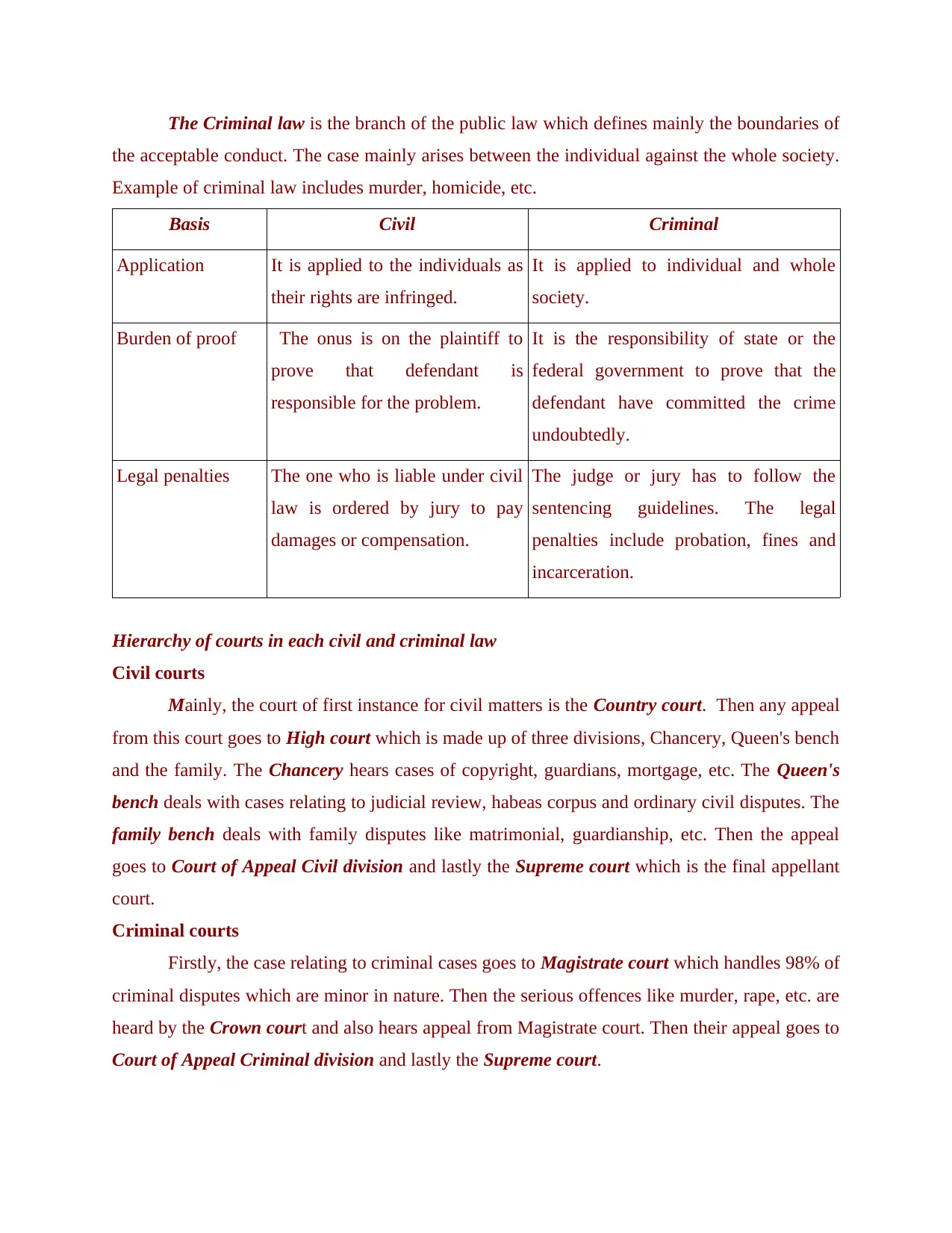
The Criminal law is the branch of the public law which defines mainly the boundaries of
the acceptable conduct. The case mainly arises between the individual against the whole society.
Example of criminal law includes murder, homicide, etc.
Basis Civil Criminal
Application It is applied to the individuals as
their rights are infringed.
It is applied to individual and whole
society.
Burden of proof The onus is on the plaintiff to
prove that defendant is
responsible for the problem.
It is the responsibility of state or the
federal government to prove that the
defendant have committed the crime
undoubtedly.
Legal penalties The one who is liable under civil
law is ordered by jury to pay
damages or compensation.
The judge or jury has to follow the
sentencing guidelines. The legal
penalties include probation, fines and
incarceration.
Hierarchy of courts in each civil and criminal law
Civil courts
Mainly, the court of first instance for civil matters is the Country court. Then any appeal
from this court goes to High court which is made up of three divisions, Chancery, Queen's bench
and the family. The Chancery hears cases of copyright, guardians, mortgage, etc. The Queen's
bench deals with cases relating to judicial review, habeas corpus and ordinary civil disputes. The
family bench deals with family disputes like matrimonial, guardianship, etc. Then the appeal
goes to Court of Appeal Civil division and lastly the Supreme court which is the final appellant
court.
Criminal courts
Firstly, the case relating to criminal cases goes to Magistrate court which handles 98% of
criminal disputes which are minor in nature. Then the serious offences like murder, rape, etc. are
heard by the Crown court and also hears appeal from Magistrate court. Then their appeal goes to
Court of Appeal Criminal division and lastly the Supreme court.
the acceptable conduct. The case mainly arises between the individual against the whole society.
Example of criminal law includes murder, homicide, etc.
Basis Civil Criminal
Application It is applied to the individuals as
their rights are infringed.
It is applied to individual and whole
society.
Burden of proof The onus is on the plaintiff to
prove that defendant is
responsible for the problem.
It is the responsibility of state or the
federal government to prove that the
defendant have committed the crime
undoubtedly.
Legal penalties The one who is liable under civil
law is ordered by jury to pay
damages or compensation.
The judge or jury has to follow the
sentencing guidelines. The legal
penalties include probation, fines and
incarceration.
Hierarchy of courts in each civil and criminal law
Civil courts
Mainly, the court of first instance for civil matters is the Country court. Then any appeal
from this court goes to High court which is made up of three divisions, Chancery, Queen's bench
and the family. The Chancery hears cases of copyright, guardians, mortgage, etc. The Queen's
bench deals with cases relating to judicial review, habeas corpus and ordinary civil disputes. The
family bench deals with family disputes like matrimonial, guardianship, etc. Then the appeal
goes to Court of Appeal Civil division and lastly the Supreme court which is the final appellant
court.
Criminal courts
Firstly, the case relating to criminal cases goes to Magistrate court which handles 98% of
criminal disputes which are minor in nature. Then the serious offences like murder, rape, etc. are
heard by the Crown court and also hears appeal from Magistrate court. Then their appeal goes to
Court of Appeal Criminal division and lastly the Supreme court.
Paraphrase This Document
Need a fresh take? Get an instant paraphrase of this document with our AI Paraphraser
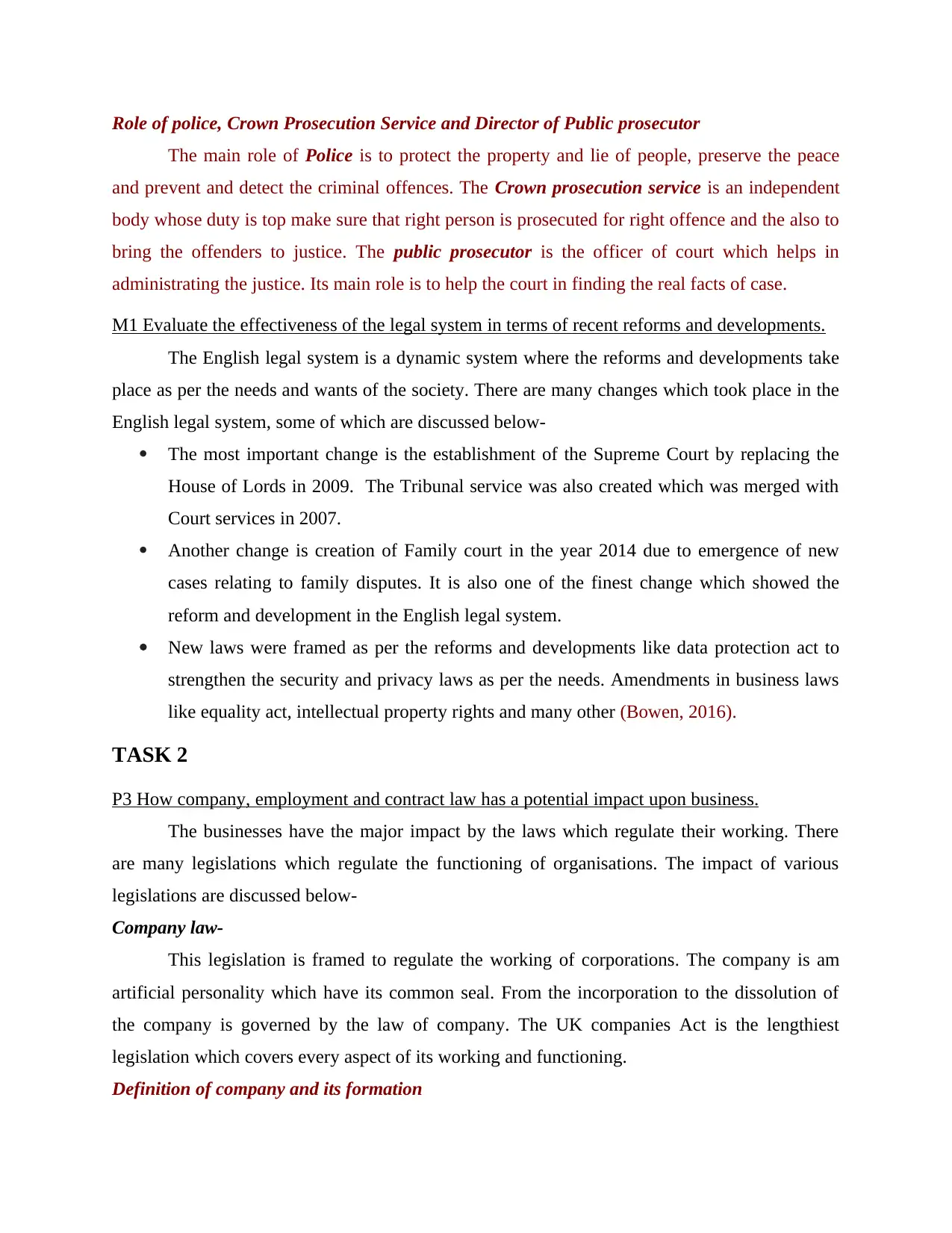
Role of police, Crown Prosecution Service and Director of Public prosecutor
The main role of Police is to protect the property and lie of people, preserve the peace
and prevent and detect the criminal offences. The Crown prosecution service is an independent
body whose duty is top make sure that right person is prosecuted for right offence and the also to
bring the offenders to justice. The public prosecutor is the officer of court which helps in
administrating the justice. Its main role is to help the court in finding the real facts of case.
M1 Evaluate the effectiveness of the legal system in terms of recent reforms and developments.
The English legal system is a dynamic system where the reforms and developments take
place as per the needs and wants of the society. There are many changes which took place in the
English legal system, some of which are discussed below-
The most important change is the establishment of the Supreme Court by replacing the
House of Lords in 2009. The Tribunal service was also created which was merged with
Court services in 2007.
Another change is creation of Family court in the year 2014 due to emergence of new
cases relating to family disputes. It is also one of the finest change which showed the
reform and development in the English legal system.
New laws were framed as per the reforms and developments like data protection act to
strengthen the security and privacy laws as per the needs. Amendments in business laws
like equality act, intellectual property rights and many other (Bowen, 2016).
TASK 2
P3 How company, employment and contract law has a potential impact upon business.
The businesses have the major impact by the laws which regulate their working. There
are many legislations which regulate the functioning of organisations. The impact of various
legislations are discussed below-
Company law-
This legislation is framed to regulate the working of corporations. The company is am
artificial personality which have its common seal. From the incorporation to the dissolution of
the company is governed by the law of company. The UK companies Act is the lengthiest
legislation which covers every aspect of its working and functioning.
Definition of company and its formation
The main role of Police is to protect the property and lie of people, preserve the peace
and prevent and detect the criminal offences. The Crown prosecution service is an independent
body whose duty is top make sure that right person is prosecuted for right offence and the also to
bring the offenders to justice. The public prosecutor is the officer of court which helps in
administrating the justice. Its main role is to help the court in finding the real facts of case.
M1 Evaluate the effectiveness of the legal system in terms of recent reforms and developments.
The English legal system is a dynamic system where the reforms and developments take
place as per the needs and wants of the society. There are many changes which took place in the
English legal system, some of which are discussed below-
The most important change is the establishment of the Supreme Court by replacing the
House of Lords in 2009. The Tribunal service was also created which was merged with
Court services in 2007.
Another change is creation of Family court in the year 2014 due to emergence of new
cases relating to family disputes. It is also one of the finest change which showed the
reform and development in the English legal system.
New laws were framed as per the reforms and developments like data protection act to
strengthen the security and privacy laws as per the needs. Amendments in business laws
like equality act, intellectual property rights and many other (Bowen, 2016).
TASK 2
P3 How company, employment and contract law has a potential impact upon business.
The businesses have the major impact by the laws which regulate their working. There
are many legislations which regulate the functioning of organisations. The impact of various
legislations are discussed below-
Company law-
This legislation is framed to regulate the working of corporations. The company is am
artificial personality which have its common seal. From the incorporation to the dissolution of
the company is governed by the law of company. The UK companies Act is the lengthiest
legislation which covers every aspect of its working and functioning.
Definition of company and its formation
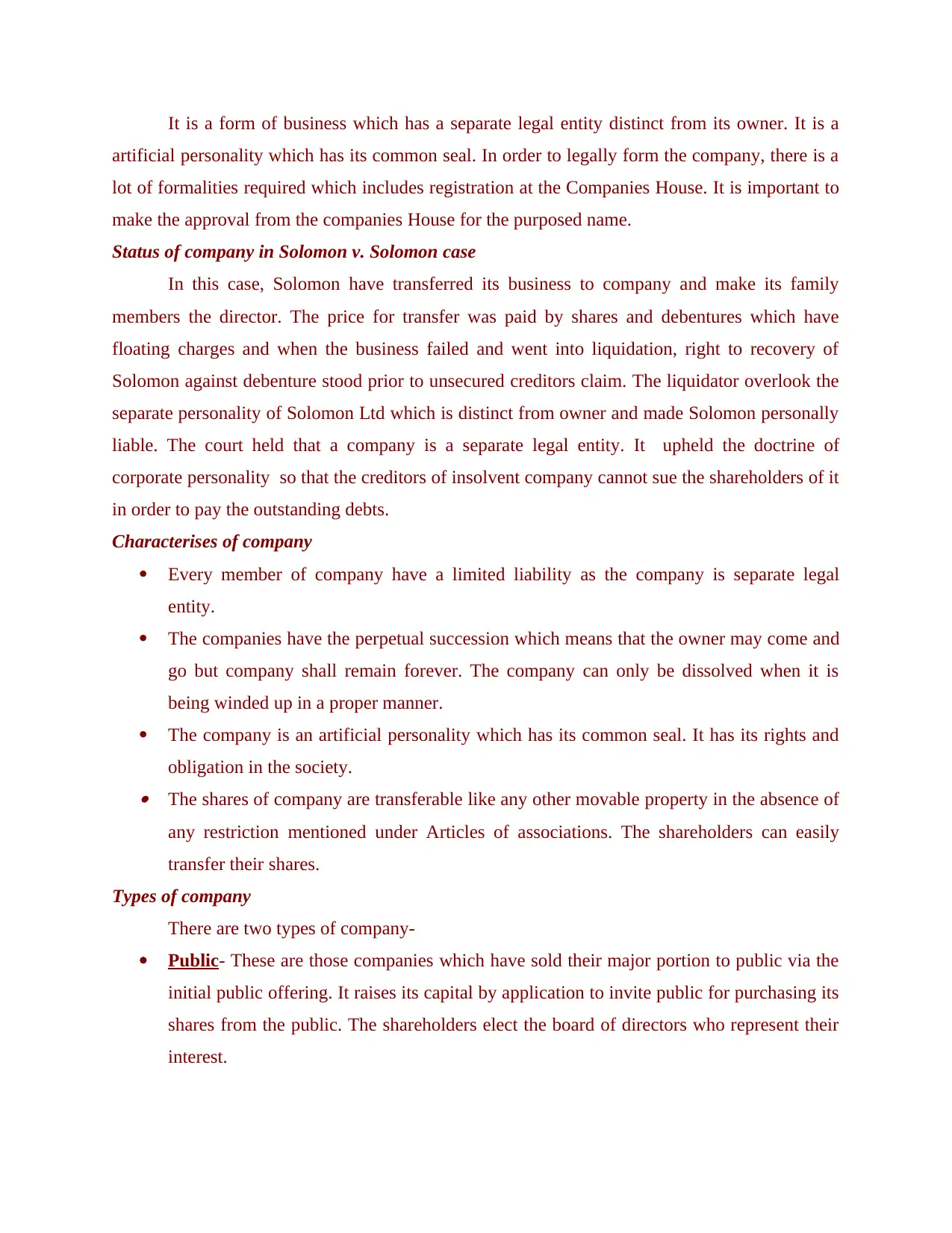
It is a form of business which has a separate legal entity distinct from its owner. It is a
artificial personality which has its common seal. In order to legally form the company, there is a
lot of formalities required which includes registration at the Companies House. It is important to
make the approval from the companies House for the purposed name.
Status of company in Solomon v. Solomon case
In this case, Solomon have transferred its business to company and make its family
members the director. The price for transfer was paid by shares and debentures which have
floating charges and when the business failed and went into liquidation, right to recovery of
Solomon against debenture stood prior to unsecured creditors claim. The liquidator overlook the
separate personality of Solomon Ltd which is distinct from owner and made Solomon personally
liable. The court held that a company is a separate legal entity. It upheld the doctrine of
corporate personality so that the creditors of insolvent company cannot sue the shareholders of it
in order to pay the outstanding debts.
Characterises of company
Every member of company have a limited liability as the company is separate legal
entity.
The companies have the perpetual succession which means that the owner may come and
go but company shall remain forever. The company can only be dissolved when it is
being winded up in a proper manner.
The company is an artificial personality which has its common seal. It has its rights and
obligation in the society. The shares of company are transferable like any other movable property in the absence of
any restriction mentioned under Articles of associations. The shareholders can easily
transfer their shares.
Types of company
There are two types of company-
Public- These are those companies which have sold their major portion to public via the
initial public offering. It raises its capital by application to invite public for purchasing its
shares from the public. The shareholders elect the board of directors who represent their
interest.
artificial personality which has its common seal. In order to legally form the company, there is a
lot of formalities required which includes registration at the Companies House. It is important to
make the approval from the companies House for the purposed name.
Status of company in Solomon v. Solomon case
In this case, Solomon have transferred its business to company and make its family
members the director. The price for transfer was paid by shares and debentures which have
floating charges and when the business failed and went into liquidation, right to recovery of
Solomon against debenture stood prior to unsecured creditors claim. The liquidator overlook the
separate personality of Solomon Ltd which is distinct from owner and made Solomon personally
liable. The court held that a company is a separate legal entity. It upheld the doctrine of
corporate personality so that the creditors of insolvent company cannot sue the shareholders of it
in order to pay the outstanding debts.
Characterises of company
Every member of company have a limited liability as the company is separate legal
entity.
The companies have the perpetual succession which means that the owner may come and
go but company shall remain forever. The company can only be dissolved when it is
being winded up in a proper manner.
The company is an artificial personality which has its common seal. It has its rights and
obligation in the society. The shares of company are transferable like any other movable property in the absence of
any restriction mentioned under Articles of associations. The shareholders can easily
transfer their shares.
Types of company
There are two types of company-
Public- These are those companies which have sold their major portion to public via the
initial public offering. It raises its capital by application to invite public for purchasing its
shares from the public. The shareholders elect the board of directors who represent their
interest.
⊘ This is a preview!⊘
Do you want full access?
Subscribe today to unlock all pages.

Trusted by 1+ million students worldwide
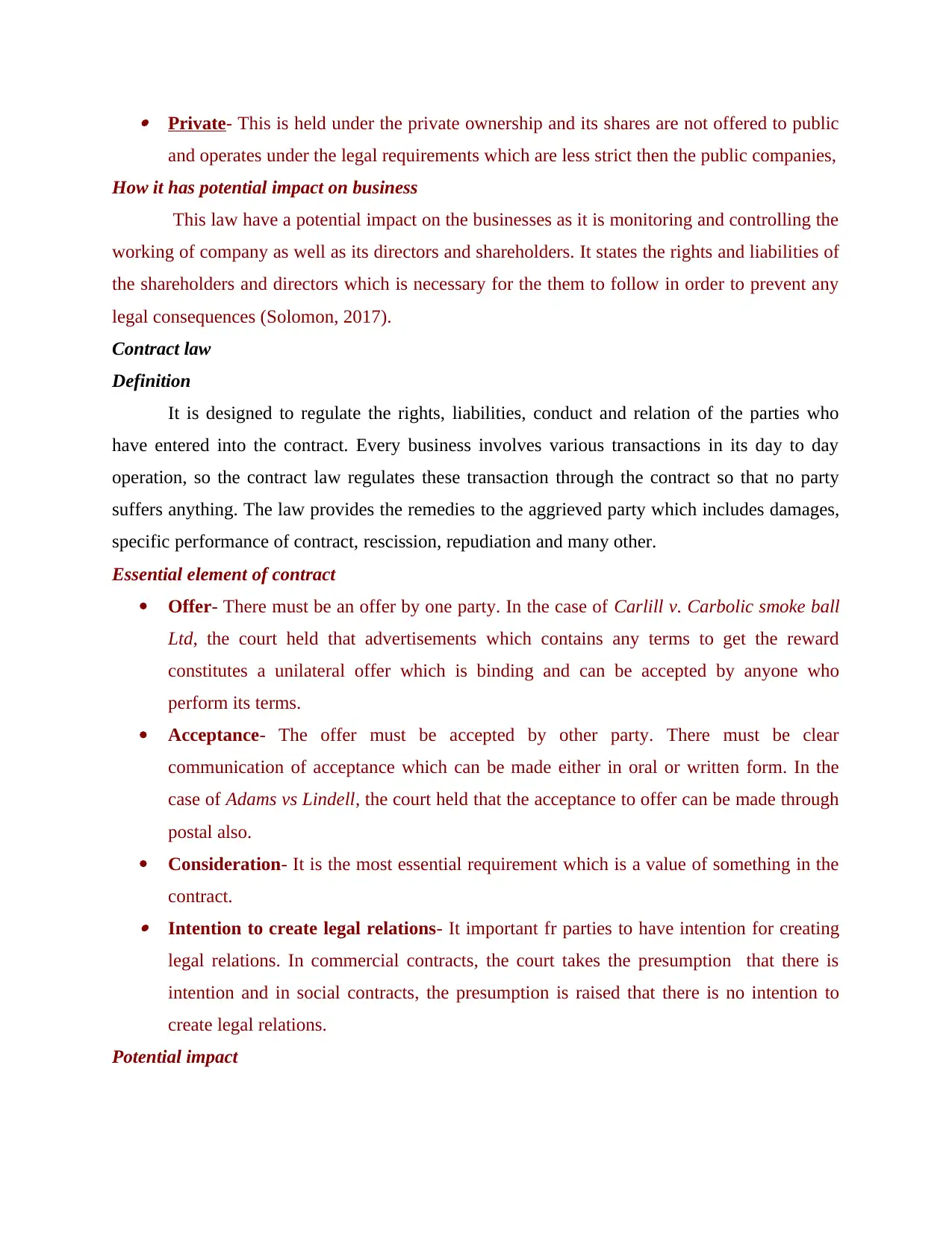
Private- This is held under the private ownership and its shares are not offered to public
and operates under the legal requirements which are less strict then the public companies,
How it has potential impact on business
This law have a potential impact on the businesses as it is monitoring and controlling the
working of company as well as its directors and shareholders. It states the rights and liabilities of
the shareholders and directors which is necessary for the them to follow in order to prevent any
legal consequences (Solomon, 2017).
Contract law
Definition
It is designed to regulate the rights, liabilities, conduct and relation of the parties who
have entered into the contract. Every business involves various transactions in its day to day
operation, so the contract law regulates these transaction through the contract so that no party
suffers anything. The law provides the remedies to the aggrieved party which includes damages,
specific performance of contract, rescission, repudiation and many other.
Essential element of contract
Offer- There must be an offer by one party. In the case of Carlill v. Carbolic smoke ball
Ltd, the court held that advertisements which contains any terms to get the reward
constitutes a unilateral offer which is binding and can be accepted by anyone who
perform its terms.
Acceptance- The offer must be accepted by other party. There must be clear
communication of acceptance which can be made either in oral or written form. In the
case of Adams vs Lindell, the court held that the acceptance to offer can be made through
postal also.
Consideration- It is the most essential requirement which is a value of something in the
contract. Intention to create legal relations- It important fr parties to have intention for creating
legal relations. In commercial contracts, the court takes the presumption that there is
intention and in social contracts, the presumption is raised that there is no intention to
create legal relations.
Potential impact
and operates under the legal requirements which are less strict then the public companies,
How it has potential impact on business
This law have a potential impact on the businesses as it is monitoring and controlling the
working of company as well as its directors and shareholders. It states the rights and liabilities of
the shareholders and directors which is necessary for the them to follow in order to prevent any
legal consequences (Solomon, 2017).
Contract law
Definition
It is designed to regulate the rights, liabilities, conduct and relation of the parties who
have entered into the contract. Every business involves various transactions in its day to day
operation, so the contract law regulates these transaction through the contract so that no party
suffers anything. The law provides the remedies to the aggrieved party which includes damages,
specific performance of contract, rescission, repudiation and many other.
Essential element of contract
Offer- There must be an offer by one party. In the case of Carlill v. Carbolic smoke ball
Ltd, the court held that advertisements which contains any terms to get the reward
constitutes a unilateral offer which is binding and can be accepted by anyone who
perform its terms.
Acceptance- The offer must be accepted by other party. There must be clear
communication of acceptance which can be made either in oral or written form. In the
case of Adams vs Lindell, the court held that the acceptance to offer can be made through
postal also.
Consideration- It is the most essential requirement which is a value of something in the
contract. Intention to create legal relations- It important fr parties to have intention for creating
legal relations. In commercial contracts, the court takes the presumption that there is
intention and in social contracts, the presumption is raised that there is no intention to
create legal relations.
Potential impact
Paraphrase This Document
Need a fresh take? Get an instant paraphrase of this document with our AI Paraphraser
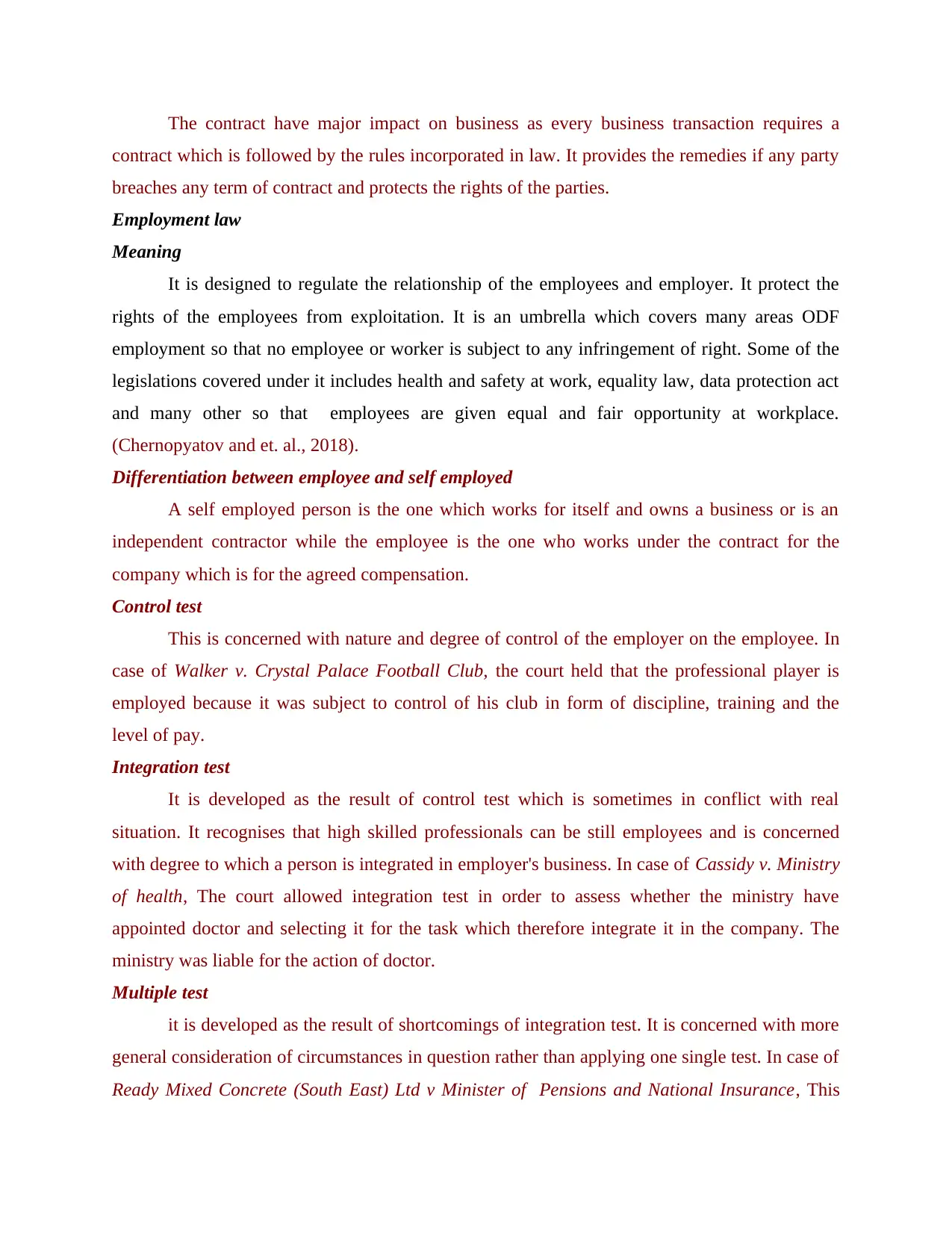
The contract have major impact on business as every business transaction requires a
contract which is followed by the rules incorporated in law. It provides the remedies if any party
breaches any term of contract and protects the rights of the parties.
Employment law
Meaning
It is designed to regulate the relationship of the employees and employer. It protect the
rights of the employees from exploitation. It is an umbrella which covers many areas ODF
employment so that no employee or worker is subject to any infringement of right. Some of the
legislations covered under it includes health and safety at work, equality law, data protection act
and many other so that employees are given equal and fair opportunity at workplace.
(Chernopyatov and et. al., 2018).
Differentiation between employee and self employed
A self employed person is the one which works for itself and owns a business or is an
independent contractor while the employee is the one who works under the contract for the
company which is for the agreed compensation.
Control test
This is concerned with nature and degree of control of the employer on the employee. In
case of Walker v. Crystal Palace Football Club, the court held that the professional player is
employed because it was subject to control of his club in form of discipline, training and the
level of pay.
Integration test
It is developed as the result of control test which is sometimes in conflict with real
situation. It recognises that high skilled professionals can be still employees and is concerned
with degree to which a person is integrated in employer's business. In case of Cassidy v. Ministry
of health, The court allowed integration test in order to assess whether the ministry have
appointed doctor and selecting it for the task which therefore integrate it in the company. The
ministry was liable for the action of doctor.
Multiple test
it is developed as the result of shortcomings of integration test. It is concerned with more
general consideration of circumstances in question rather than applying one single test. In case of
Ready Mixed Concrete (South East) Ltd v Minister of Pensions and National Insurance, This
contract which is followed by the rules incorporated in law. It provides the remedies if any party
breaches any term of contract and protects the rights of the parties.
Employment law
Meaning
It is designed to regulate the relationship of the employees and employer. It protect the
rights of the employees from exploitation. It is an umbrella which covers many areas ODF
employment so that no employee or worker is subject to any infringement of right. Some of the
legislations covered under it includes health and safety at work, equality law, data protection act
and many other so that employees are given equal and fair opportunity at workplace.
(Chernopyatov and et. al., 2018).
Differentiation between employee and self employed
A self employed person is the one which works for itself and owns a business or is an
independent contractor while the employee is the one who works under the contract for the
company which is for the agreed compensation.
Control test
This is concerned with nature and degree of control of the employer on the employee. In
case of Walker v. Crystal Palace Football Club, the court held that the professional player is
employed because it was subject to control of his club in form of discipline, training and the
level of pay.
Integration test
It is developed as the result of control test which is sometimes in conflict with real
situation. It recognises that high skilled professionals can be still employees and is concerned
with degree to which a person is integrated in employer's business. In case of Cassidy v. Ministry
of health, The court allowed integration test in order to assess whether the ministry have
appointed doctor and selecting it for the task which therefore integrate it in the company. The
ministry was liable for the action of doctor.
Multiple test
it is developed as the result of shortcomings of integration test. It is concerned with more
general consideration of circumstances in question rather than applying one single test. In case of
Ready Mixed Concrete (South East) Ltd v Minister of Pensions and National Insurance, This
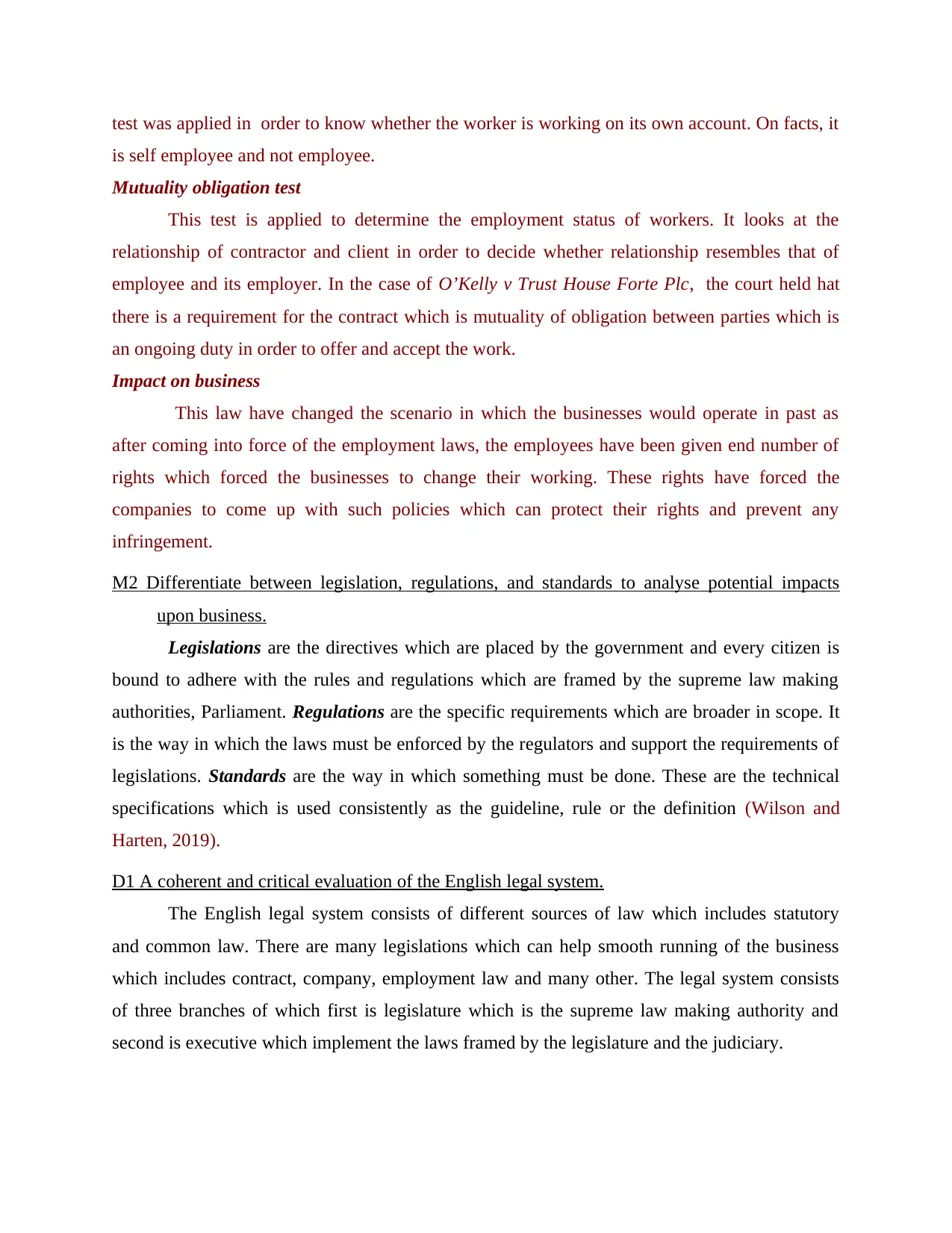
test was applied in order to know whether the worker is working on its own account. On facts, it
is self employee and not employee.
Mutuality obligation test
This test is applied to determine the employment status of workers. It looks at the
relationship of contractor and client in order to decide whether relationship resembles that of
employee and its employer. In the case of O’Kelly v Trust House Forte Plc, the court held hat
there is a requirement for the contract which is mutuality of obligation between parties which is
an ongoing duty in order to offer and accept the work.
Impact on business
This law have changed the scenario in which the businesses would operate in past as
after coming into force of the employment laws, the employees have been given end number of
rights which forced the businesses to change their working. These rights have forced the
companies to come up with such policies which can protect their rights and prevent any
infringement.
M2 Differentiate between legislation, regulations, and standards to analyse potential impacts
upon business.
Legislations are the directives which are placed by the government and every citizen is
bound to adhere with the rules and regulations which are framed by the supreme law making
authorities, Parliament. Regulations are the specific requirements which are broader in scope. It
is the way in which the laws must be enforced by the regulators and support the requirements of
legislations. Standards are the way in which something must be done. These are the technical
specifications which is used consistently as the guideline, rule or the definition (Wilson and
Harten, 2019).
D1 A coherent and critical evaluation of the English legal system.
The English legal system consists of different sources of law which includes statutory
and common law. There are many legislations which can help smooth running of the business
which includes contract, company, employment law and many other. The legal system consists
of three branches of which first is legislature which is the supreme law making authority and
second is executive which implement the laws framed by the legislature and the judiciary.
is self employee and not employee.
Mutuality obligation test
This test is applied to determine the employment status of workers. It looks at the
relationship of contractor and client in order to decide whether relationship resembles that of
employee and its employer. In the case of O’Kelly v Trust House Forte Plc, the court held hat
there is a requirement for the contract which is mutuality of obligation between parties which is
an ongoing duty in order to offer and accept the work.
Impact on business
This law have changed the scenario in which the businesses would operate in past as
after coming into force of the employment laws, the employees have been given end number of
rights which forced the businesses to change their working. These rights have forced the
companies to come up with such policies which can protect their rights and prevent any
infringement.
M2 Differentiate between legislation, regulations, and standards to analyse potential impacts
upon business.
Legislations are the directives which are placed by the government and every citizen is
bound to adhere with the rules and regulations which are framed by the supreme law making
authorities, Parliament. Regulations are the specific requirements which are broader in scope. It
is the way in which the laws must be enforced by the regulators and support the requirements of
legislations. Standards are the way in which something must be done. These are the technical
specifications which is used consistently as the guideline, rule or the definition (Wilson and
Harten, 2019).
D1 A coherent and critical evaluation of the English legal system.
The English legal system consists of different sources of law which includes statutory
and common law. There are many legislations which can help smooth running of the business
which includes contract, company, employment law and many other. The legal system consists
of three branches of which first is legislature which is the supreme law making authority and
second is executive which implement the laws framed by the legislature and the judiciary.
⊘ This is a preview!⊘
Do you want full access?
Subscribe today to unlock all pages.

Trusted by 1+ million students worldwide
1 out of 22
Related Documents
Your All-in-One AI-Powered Toolkit for Academic Success.
+13062052269
info@desklib.com
Available 24*7 on WhatsApp / Email
![[object Object]](/_next/static/media/star-bottom.7253800d.svg)
Unlock your academic potential
Copyright © 2020–2026 A2Z Services. All Rights Reserved. Developed and managed by ZUCOL.




